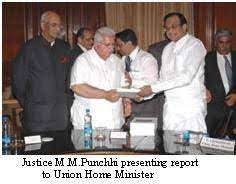The Punchhi Commission, officially known as the Commission on Centre-State Relations, was constituted in 2007 to examine and review the balance of power between the central and state governments in India. The report of the commission, which was submitted in 2010, had far-reaching recommendations on various issues related to federalism and the distribution of powers in India.

Table of Contents
Why the commission was formed?
The Punchhi Commission was established in the context of growing demands for greater autonomy and decentralization of power in India. The commission was chaired by Justice Madan Mohan Punchhi, a former Chief Justice of India, and included experts from various fields, including law, economics, and public administration.
Key recommendations
Distribution of Powers
One of the key recommendations of the Punchhi Commission was to ensure a more equitable distribution of powers between the central and state governments. The report recommended that greater autonomy should be given to states in areas such as finance, planning, and social welfare. The commission suggested that central funds should be allocated to states based on specific criteria such as population, area, and development indicators. This would allow for a more balanced distribution of resources and help to address regional imbalances in development.
Role of Governors
The report recommended that Governors should be appointed in consultation with the Chief Ministers of the states. It also suggested that the Governors should act as a bridge between the central and state governments and should work to promote cooperation and coordination between the two levels of government. The governor should have a fixed tenure and can be removed by the process of impeachment.
Local Governance
The Punchhi Commission report also had recommendations on local governance. The commission suggested that a third tier of government consisting of panchayats and municipalities should be created with greater powers and resources. The report recommended that local bodies should be empowered to provide effective and participatory governance. This would help to promote grassroots democracy and ensure that local issues are addressed in a more efficient and effective manner.
Article 356
The report also recommended a review of Article 356, which allows for the imposition of President’s Rule in a state in case of a breakdown of constitutional machinery. The commission suggested that the article should be used only as a last resort and that it should not be misused for political purposes. The report recommended that guidelines should be put in place to ensure that the article is used only in exceptional circumstances.
Regional Imbalances
The Punchhi Commission report recognized the regional imbalances in development across the country. The report recommended that special provisions should be made for backward regions to ensure that they receive adequate resources and attention. The commission suggested that a separate ministry should be created to address the issues of backward regions.
Constitutional Offices
The commission also recommended the establishment of an independent constitutional body to oversee appointments to high constitutional offices such as the Chief Election Commissioner, the Chief Information Commissioner, and the Comptroller and Auditor General. The report suggested that such appointments should be made in a transparent and non-partisan manner to ensure the integrity and independence of these offices.
Cooperative Federalism
Finally, the Punchhi Commission report emphasized the need for cooperative federalism and active engagement between central and state governments. The commission suggested that a more collaborative approach should be adopted to resolve disputes and promote development. The report recommended that regular meetings should be held between the Prime Minister and Chief Ministers to discuss issues related to federalism and governance.
Concurrent List
The centre should actively consult the state government before legislating on the subjects included in the concurrent list.
Finance Commission
Change Finance Commission to a department.
Conclusion of Punchhi Commission Report
The Punchhi Commission report was a landmark document that addressed several important issues related to federalism and the distribution of powers in India. While some of its recommendations have been implemented, others remain unimplemented due to political and administrative hurdles. Nevertheless, the report remains an important reference point for scholars, policymakers, and citizens interested in issues of governance and federalism in India.
Important Links